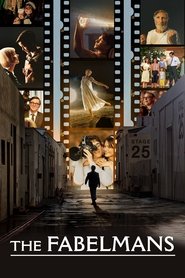This movie's first hour has an extremely artificial and hokey quality that bespeaks some underlying skeleton in the Fableman's closet. Of course, anyone who knows anything about this film specifically or the divorce of Spielberg's parents in general already knows what this 'secret' is, so keeping up the charade for so long gets a little tiresome after a while.
The joke is on the viewer, however, as even when the secret is undramatically revealed by the film in a scene playing homage to Michelangelo Antonioni's Blow-Up (1966) by way of Francis Ford Coppola's The Conversation (1974), the stagey feel of the whole affair (which you thought was a narrative representative of Mitzi's illicit affair with Benny) continues for the remaining hour-and-a-half slog to the end. During that time, the film evinces a lack of interest in doing anything of much interest beyond sporting new angles of its highly-aggressive 1950s set-dressing, props, costuming and make-up. Well, that's not entirely fair: there's also the rather galling fanservice that references future Spielberg movies and an obvious subplot involving anti-Semitic bullying that was so sententious it wouldn't make the edit for an ABC After School special. Oh, and I forgot the potentially unintended homoerotic subplot with the school's jock, 'Chad'. (I am not joking about the name.)
Judd Hirsch as Uncle Boris was the only actor who really did anything worthy of admiration: Paul Dano alternatively generally just looked gormless the entire movie and pulled up his trousers every so often, and Michelle Williams always looked somehow both out-of-place and unnaturally made-up at the same time; her insistent lipstick being something of an unintentional symbol of the film's inability to disguise its fundamental failings. And the less I talk about Seth Rogen's 'attaboy' schtick, the better. On the other hand, Gabriel LaBelle and the other Fabelman children deserve some credit for not rolling their eyes at their lines, which often granted these otherwise incredibly awkward twelve- and fourteen-year-olds with the social intelligence and acuity of a seventy-year-old film screenwriter.
The net effect of all these flaws means that the audience is left with nothing else to consider save whether they 'like' or 'dislike' any given character or not — surely the most base and superficial form of artistic engagement that is possible. As self-mythologising goes, though, even this seems like an own goal by Spielberg here, as it's impossible to see Sammy 'Steven' Fabelman as anything other than a spoiled, selfish and self-centred jerk who cannot even condone the question of his mother's happiness.
If you really want a recent movie about a filmmaker looking back at their life, I'd recommend watching James Gray's Armageddon Time (2022) Charlotte Wells' Aftersun (2022) instead.

